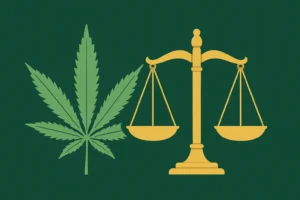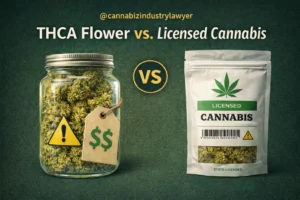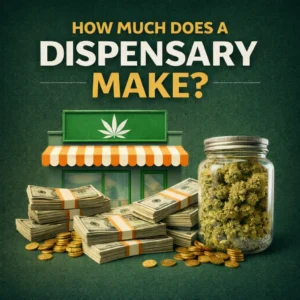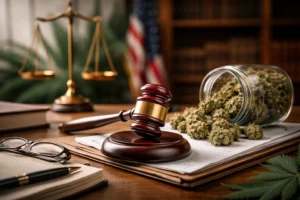Introduction: When Compliance Becomes Combat

But when regulators overreach, rules conflict, or enforcement turns arbitrary, your business deserves more than compliance. It deserves a defense.
At Howard Law Group, we represent cannabis licensees and stakeholders in regulatory and compliance litigation—from defending administrative actions to challenging unconstitutional agency rules that threaten your investment and livelihood.
What Is Cannabis Regulatory & Compliance Litigation?
This is the legal battleground where business law meets administrative power.
It includes cases involving:
-
Agency enforcement actions (e.g., IDFPR, IDOA, state cannabis control boards)
-
Rulemaking challenges to unlawful or inconsistent regulations
-
Zoning and municipal disputes over location restrictions or operational limits
-
Labeling and packaging violations with public safety implications
-
Licensing appeals for denials, suspensions, or revocations
-
Interstate compliance and multi-state jurisdiction issues
These matters often turn on interpretation—whether a rule is lawful, consistent with statute, or arbitrarily applied. That’s where deep knowledge of administrative law and cannabis regulation intersects.
Legally: This strengthens subject matter authority under administrative and cannabis control acts (410 ILCS 705 et seq., 68 IAC § 1291).
Our Approach: Lawful, Strategic, and Surgical
We don’t just react to agency letters—we anticipate them.
Our team combines litigation experience, regulatory insight, and business strategy to deliver one result: keep your license operational and your business profitable.
Our litigation strategy includes:
-
Pre-enforcement defense: Responding early to notices of deficiency or warning letters
-
Administrative hearing defense: Challenging findings and agency procedures
-
Judicial review petitions: Filing under Illinois’ Administrative Review Law and comparable state statutes
-
Constitutional challenges: Attacking vague, arbitrary, or conflicting rules that violate due process or equal protection
-
Zoning and land-use appeals: Defending site plans and occupancy permits before boards or courts
Our goal is to minimize penalties, prevent shutdowns, and build favorable precedent for the industry.
Strategically: This undercuts regulatory overreach while preserving operational continuity and investor confidence.
Case Insight: When “Compliance” Becomes a Weapon
In many enforcement cases, regulators conflate technical violations (like recordkeeping errors) with material breaches (like diversion).
We argue those distinctions clearly—and often successfully—by focusing on statutory authority, agency consistency, and evidentiary standards.
Example scenarios:
-
Labeling misprint penalties exceeding statutory fines
-
Selective enforcement between license classes or jurisdictions
-
Local zoning boards exceeding state preemption limits
In each, our defense uses agency records, comparative enforcement data, and statutory interpretation to demonstrate arbitrary or capricious action.
Legally: These strategies preserve judicial appeal rights and establish favorable administrative precedent.
Multi-Jurisdictional Litigation Experience
Our firm handles cannabis regulatory disputes across Illinois, Michigan, and emerging markets like Missouri and New York.
We coordinate with local counsel, monitor rulemaking changes, and ensure each case supports your broader business plan.
That’s key—regulatory litigation isn’t just legal; it’s strategic asset protection.
Why Businesses Trust Howard Law Group
-
15+ years of administrative and regulatory litigation
-
Licensed in multiple jurisdictions
-
Recognized authority in cannabis business law and licensing
-
Counsel for applicants, licensees, and investors across the U.S.
-
Track record of defending against multimillion-dollar penalties and protecting equity ownership rights
When compliance challenges arise, we fight with precision, not panic.
The Bottom Line: Compliance Is the New Litigation Frontier
As cannabis markets mature, enforcement risk rises. Whether your issue involves IDFPR penalties, zoning board denials, or labeling enforcement, early legal intervention can mean the difference between a warning and a revocation.
If your business faces agency scrutiny—or you anticipate it—contact our Cannabis Regulatory & Compliance Litigation team today.
Howard Law Group, LLC
Experienced. Strategic. Relentless in defense of your license.
Cannabis Regulatory & Compliance Litigation – FAQ
Q1: What is cannabis regulatory and compliance litigation?
Cannabis regulatory and compliance litigation involves defending licensed operators against government actions, such as administrative penalties, license suspensions, or zoning board disputes. It also includes challenging unlawful or inconsistent rulemaking by state agencies. In short—it’s how cannabis businesses protect their licenses when the rules shift mid-game.
Q2: What agencies bring enforcement actions against cannabis businesses?
Most enforcement originates from state agencies such as the Illinois Department of Financial and Professional Regulation (IDFPR), Illinois Department of Agriculture (IDOA), Michigan Cannabis Regulatory Agency (CRA), or local zoning boards. Federal agencies may also get involved if an investigation implicates interstate commerce, banking, or advertising laws.
Q3: What are the most common regulatory violations?
Typical allegations include:
-
Improper labeling or packaging
-
Recordkeeping or inventory discrepancies
-
Unapproved product formulations or THC variances
-
Marketing violations under state advertising restrictions
-
Security or surveillance compliance failures
-
Ownership or financial-interest disclosure omissions
Q4: Can a cannabis business appeal a license denial or suspension?
Yes. Under the Illinois Administrative Review Law (735 ILCS 5/3-101 et seq.) and comparable state statutes, licensees may seek judicial review after exhausting administrative remedies. Timing is critical—missing a statutory filing deadline can forfeit your right to appeal.
Q5: How can zoning disputes affect cannabis operations?
Zoning disputes often arise when municipalities impose additional distance or use restrictions beyond state requirements. These can delay openings or lead to selective enforcement claims. Our team routinely challenges unlawful local ordinances that conflict with state preemption under the Cannabis Regulation and Tax Act (410 ILCS 705).
Q6: How do you defend against labeling or packaging enforcement?
We scrutinize the statutory basis for penalties and the evidentiary record. Many “violations” stem from clerical or vendor errors, not willful misconduct. Demonstrating good-faith compliance efforts, vendor training, and corrective actions often leads to dismissal or reduction of fines.
Q7: What makes regulatory litigation different from civil litigation?
Administrative litigation moves faster and depends heavily on procedural precision. Instead of juries, cases are heard by hearing officers or administrative law judges. Effective counsel must master both substantive cannabis law and procedural administrative law—a rare combination we’ve built through years of multi-state defense work.
Q8: How can proactive compliance prevent future litigation?
Implementing a robust compliance management system—covering SOPs, employee training, and audit readiness—reduces risk exposure. Proactive review before rule changes or renewals can save thousands in legal fees and protect operational continuity.
Q9: Does your firm handle cases outside Illinois?
Yes. Howard Law Group collaborates with local counsel in Michigan, Missouri, New Jersey, and other emerging markets to provide coordinated multi-jurisdictional representation. Our focus is consistent: protect the license, preserve the business, and challenge regulatory overreach.
Q10: When should I contact a cannabis Regulatory & Compliance Litigation attorney?
Immediately upon receiving a notice of deficiency, warning letter, or license action notice. Early legal intervention allows for negotiation, evidentiary preservation, and strategic positioning before escalation to full litigation.




